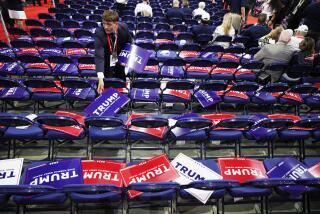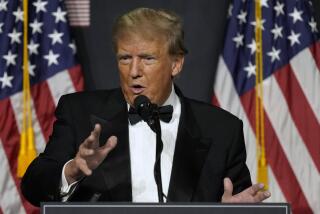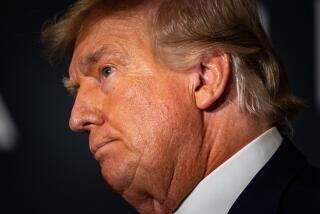Bush Vows Not to Stray From Campaign Plan : Republicans: Top advisers argue for a more aggressive appeal to voters, but President embraces current cautious strategy.
- Share via
WASHINGTON — Despite mounting Republican anxiety about his misfiring campaign, President Bush insisted Sunday that he sees no need to recalibrate a cautious reelection strategy that has been called into question by surging support for Texas billionaire Ross Perot.
Vowing instead to “stay with it,” Bush appeared to have turned aside the increasingly vocal advice of top Republican lawmakers and other advisers who argue that he must appeal more aggressively to alienated American voters.
Bush made it clear that he has no intention of straying from a strategy, laid down months ago, that calls for him to stand firm behind his legislative agenda and spend the summer attacking Congress rather than his opponents.
That approach has left some Republicans apprehensive, including House Minority Whip Newt Gingrich (R-Ga.), who complained publicly Sunday that the White House game plan seems to “misunderstand where America is at.”
A senior Bush campaign official acknowledged that such sentiment is shared among some presidential advisers who believe that the election year has become “not just a whole new ball game, but a whole new sport.”
But their recommendations for change apparently have been overruled by Chief of Staff Samuel K. Skinner and Bush campaign chairman Robert M. Teeter, who were said to remain unpersuaded that any fundamental shift in strategy is necessary.
Appearing at a joint news conference with British Prime Minister John Major, Bush conceded that Perot’s name “came up” in weekend conversation between the two leaders and mused that he was running for reelection in what has become “a weird year.” But he said he took solace in the come-from-behind victory won by his conservative counterpart in British elections earlier this year.
“I told him I feel confident of winning,” Bush said at the end of Major’s two-day visit to the President’s retreat at Camp David, Md. “I do better when I’m fighting. I do better when I’m coming from behind. And I’m one who remembers four years ago, maybe to this very minute, being maybe 17 points back.”
Sources close to Bush said his comments reflect a belief that Perot--who is looking more and more like an independent candidate--cannot sustain his popularity. But other Republicans expressed concern that the stay-the-course strategy is a product more of paralysis than of calculation.
One campaign official said there is a consensus among Bush advisers that “different things have to be done.”
But, another aide said: “It’s true that nobody knows what to do.”
At a time when Perot has jumped into the lead in some national presidential preference polls, the campaign game plan described by Bush differs hardly at all from that drafted by advisers at a time when the election appeared likely to be a two-man race.
The strategy calls for Bush to devote most of his time and attention to presidential business to maximize his stature and emphasize his differences with the Democrat-controlled Congress he blames for inaction.
“Our ideas . . . are in accord with the thinking of the American people,” Bush said in the news conference, as he pledged to spend the next few months “trying to get a few things through the Congress.”
“That requires bipartisan support, like the balanced budget amendment, trying to get that done; like educational reform, we’re trying to get (that) done; anti-crime legislation, trying to get that done,” Bush said.
Bush gave no indication that he planned any change in course to address the voter sentiments apparently aroused by Perot.
As one of an increasing number of Republicans troubled by that approach, Gingrich took the unusual step last week of circulating a memorandum to top White House and Bush-Quayle campaign officials urging that Bush move swiftly to adopt a new course.
A copy of the memo was first obtained by the Washington Post, and Gingrich affirmed his authorship during a television appearance Sunday. He complained that Bush aides were behaving as if 1992 were a conventional year and warned that the course being set by the White House could permit Perot to win the election outright.
“The President’s staff is saying let’s run a normal campaign,” Gingrich said on CNN. “I think that is to misunderstand where America is at. The American people want us to put our country ahead of politics.”
Asked about Gingrich’s memorandum during the news conference, Bush said he had not read it. Other officials said later that his comments were intended to endorse the stay-the-course strategy advocated by Skinner and Teeter.
In responding to the surge in support for Perot, the two officials were said to have approved only tactical changes in the Bush-Quayle operation. A daily 7:30 a.m. White House senior staff meeting has been expanded to include senior campaign officials, and aides are planning to make Bush available for more television interviews, news conferences and other forums that allow him to speak to voters unfiltered by the media.
But while the White House seems intent on conveying the public impression that it is unconcerned about Bush’s current plight, its alarm is increasingly evident. Skinner has told visitors that he is concentrating for now on presidential matters, but he is said to have commissioned an aide to do research on three-way elections.
More to Read
Get the L.A. Times Politics newsletter
Deeply reported insights into legislation, politics and policy from Sacramento, Washington and beyond. In your inbox twice per week.
You may occasionally receive promotional content from the Los Angeles Times.










